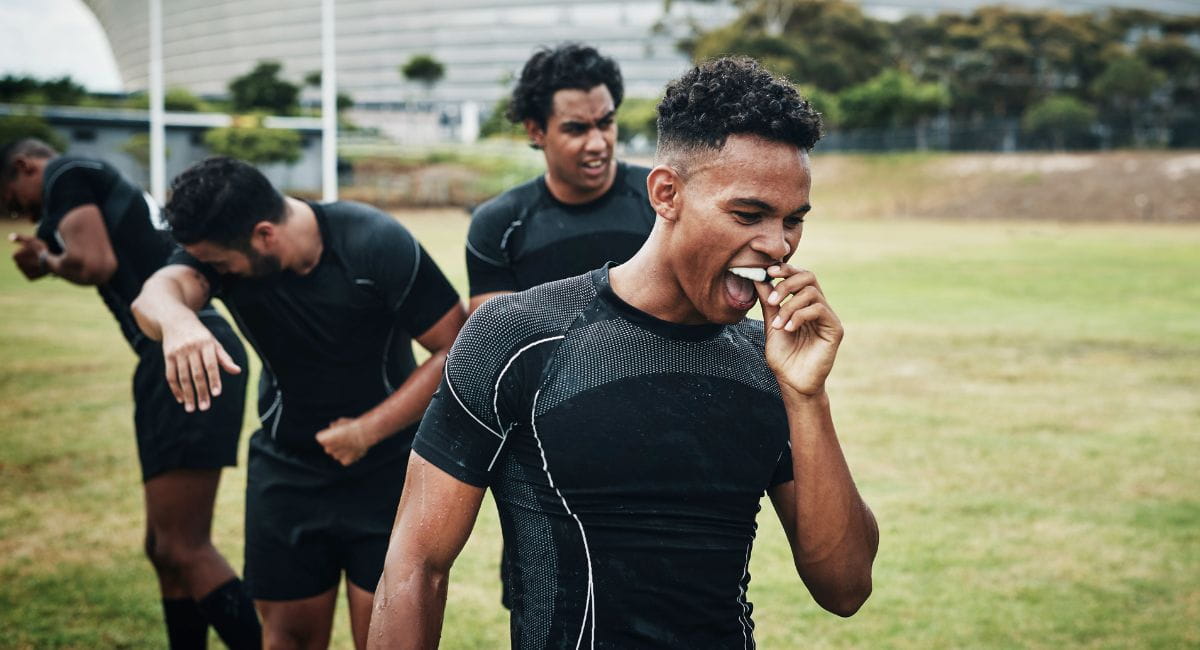“Generally, children are happy to wear mouthguards and parents are supportive, as everyone understands the importance of good teeth.” – Belinda Nelson, President of Ascot Vale Panthers Football Club.
Key points
- If you or a loved one is thinking about participating in winter sports, then a mouthguard is an essential piece of equipment.
- Australian Unity recommends custom-made mouthguards.
- Custom-made are designed to fit the contours of your teeth and mouth, offering the best protection, fit and comfort level available.
With winter sports just around the corner—or preseason already underway—now is the time to start thinking about protecting one of your most important assets, your teeth.
Teeth play an important role for us, such as eating, talking and smiling, so there is no doubt we need to protect them to maintain our Real Wellbeing.
According to the Australian Dental Association, a mouthguard can protect people from serious sporting injuries such as broken jaws; fractured, cracked, or knocked-out teeth; and cut lips or tongue.
Regardless of the sport, there is always the risk of dental injury, which can be difficult to treat and may involve a lifetime of ongoing dental treatment and expenses.
So, investing in a mouthguard is a smart decision. It’s not only contact sports that can lead to dental injuries, even low-contact sports like cricket, basketball, netball and soccer can carry a risk of damage to the teeth and mouth.
This is echoed by Nick Swingler, Head Trainer at Sturt Football Club, an Australian Rules Football team that competes in the South Australian National Football League.
Nick says that through education in schools, junior footy clubs and from their dentist, players these days are more aware of the importance of protecting their teeth than they were when he started at the club in the 1980s.
“The majority of players I’ve seen are compliant, but one lad who is very proud of his appearance, forgot to bring his mouthguard to a night game against Norwood,” Nick recounts.
“He got elbowed in the mouth and dislodged two front teeth, it was night-time so he couldn't get anything done about it until the day after.
“He had a 45-minute drive home lamenting his mistake. In the end they were able to fix it up, but he's now having to have treatment down the track because of the trauma he had at the time.”

'No Mouthguard, No Play'
If Nick’s story hasn’t encouraged you to invest in a mouthguard, then depending on the sports association or the club you play for, the decision may be out of your hands.
The Australian Dental Association and Sports Medicine Australia encourage all Australian sports clubs to implement a 'no mouthguard, no play' policy, and many sports associations mandate the use of mouthguards.
Belinda Nelson, President of the Ascot Vale Panthers Football Club, a junior Australian Rules team in Melbourne’s inner-North, says her league mandates the use of mouthguards in all junior matches and she’s supportive of this decision.
“Generally, children are happy to wear mouthguards and parents are supportive, as everyone understands the importance of good teeth,” Belinda says.
“By the time children get to 12 years old when games are more physical, they have most of their adult teeth which need to last them for life.”
How does a mouthguard work?
According to the Australian Dental Association a sports mouthguard is a device worn over the teeth and gums to protect the mouth from injury during athletic activities. The guard acts to absorb and spread the impact of a knock to the face, which may otherwise result in an injury to the mouth or jaw.
There are several types available, including custom-fitted, ‘boil-and-bite’ and generic mouthguards.
Custom-made
Australian Unity recommends custom-made mouthguards because they are designed to fit the contours of your teeth and mouth, offering the best protection, fit and comfort level available.
To make the mouthguard, a dentist will make a mold or take a 3D scan of your teeth, this ensures they can create a mouthguard that fits precisely around your teeth and gums.
.jpg)
‘Boil-and-bite’ and stock mouthguards
Chemists and sports stores often offer two types of generic mouthguards, 'boil-and-bite' and stock mouthguards. Stock mouthguards come in varying sizes, but are a one-size-fits-most option. ‘Boil-and-bite’ are similar, however users can submerge the mouthguard in boiling water and then adjust the guard to fit their mouth shape. But, this do-it-yourself process may not offer the highest level of protection available.
Store-bought options often fit poorly and may remain loose in the mouth. They do not provide the same level of protection as a custom-made mouthguard and may even interfere with talking or breathing.
Belinda Nelson says there is a clear difference between the custom-made and generic options.
“There are times when parents have chosen to purchase a generic mouthguard and typically they don’t fit well and don’t stay in their child’s mouth,” Belinda explains.
“And we often see children biting them or chewing on them.
“As a club we book in a mobile mouthguard service to come to the club and fit all children on the spot. We do that to ensure the majority of kids have proper fitting mouthguards which sit in their mouth comfortably and stay in for the duration of the game.”
Mouthguard care
If properly used, stored, and checked by your dentist, a custom-fitted mouthguard should last several sporting seasons for people who are no longer growing.
Australian Unity recommends that people rinse their mouthguard in cool or warm water after wearing, dry and store in a protective case. It is also recommended that the owner’s name is written on both the mouthguard and the case.
Surprisingly, caring-for and cleaning mouthguards is something many players aren’t good at. Nick Swingler says he uses gloves to pick-up dirty mouthguards his players have “just dropped around” and some players “just throw them in their bag after a match without washing them”.
“Players should scrub them with toothpaste and keep them in the container they come with,” Nick advises.
“Once you've got the mouthguard you need to look after it, it's not just taking it out of your mouth and throwing it in your bag. Wash it in the shower immediately after a game, put it back in the container and look after it during the week, this way they’ll tend to last.”
Whether you are a first-time player, a caring parent, or a weekend warrior, wearing a mouthguard can help keep you, or your loved one, safe on the playing field. Don’t delay, book an appointment to talk to your dentist about getting a new mouthguard for your sport or hobby of choice.
Disclaimer: Information provided in this article is not medical advice and you should consult with your healthcare practitioner. Australian Unity accepts no responsibility for the accuracy of any of the opinions, advice, representations or information contained in this publication. Readers should rely on their own advice and enquiries in making decisions affecting their own health, wellbeing or interest.


